Border Management: Regulatory Roles and Impact of Trade Facilitation
VerifiedAdded on 2023/06/04
|7
|1791
|309
Essay
AI Summary
This essay explores the evolving role of border agencies, influenced by factors such as terrorist attacks and commercial interdependence. It examines the shift from a historical 'gatekeeper' role to a more complex function of regulating and facilitating trade in the global environment. The creation of the Department of Homeland Security (DHS) and agreements like the US-Mexico Border Partnership Agreement are discussed in the context of increased security measures. The essay also analyzes the regulatory roles of border agencies, including facilitating the movement of people and providing protection against illegal activities, and how these roles impact trade facilitation, highlighting examples such as infrastructure projects and customs administration improvements. It concludes by emphasizing the importance of coordinated security measures and trade facilitation efforts between countries like the US, Canada, and Mexico.
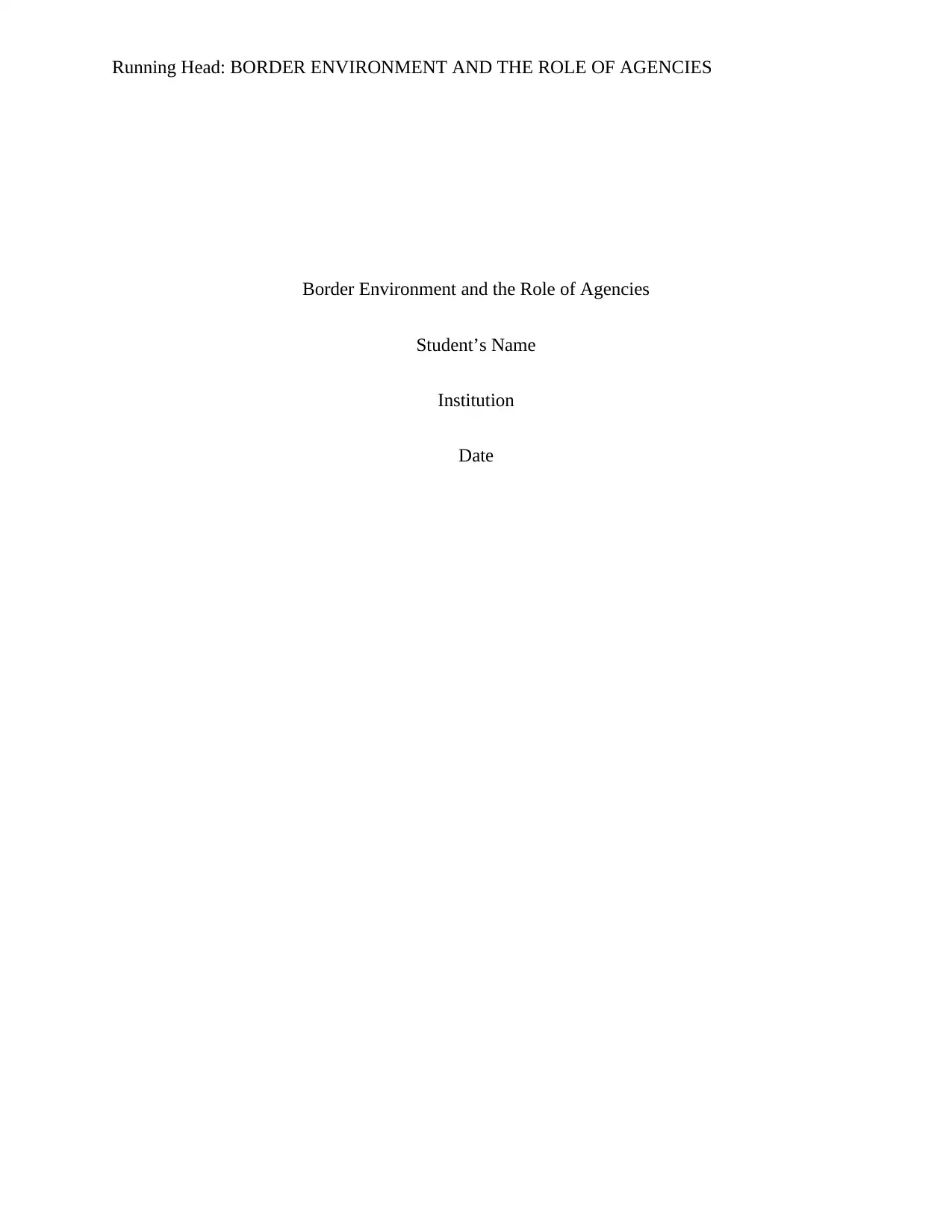
Running Head: BORDER ENVIRONMENT AND THE ROLE OF AGENCIES
Border Environment and the Role of Agencies
Student’s Name
Institution
Date
Border Environment and the Role of Agencies
Student’s Name
Institution
Date
Paraphrase This Document
Need a fresh take? Get an instant paraphrase of this document with our AI Paraphraser
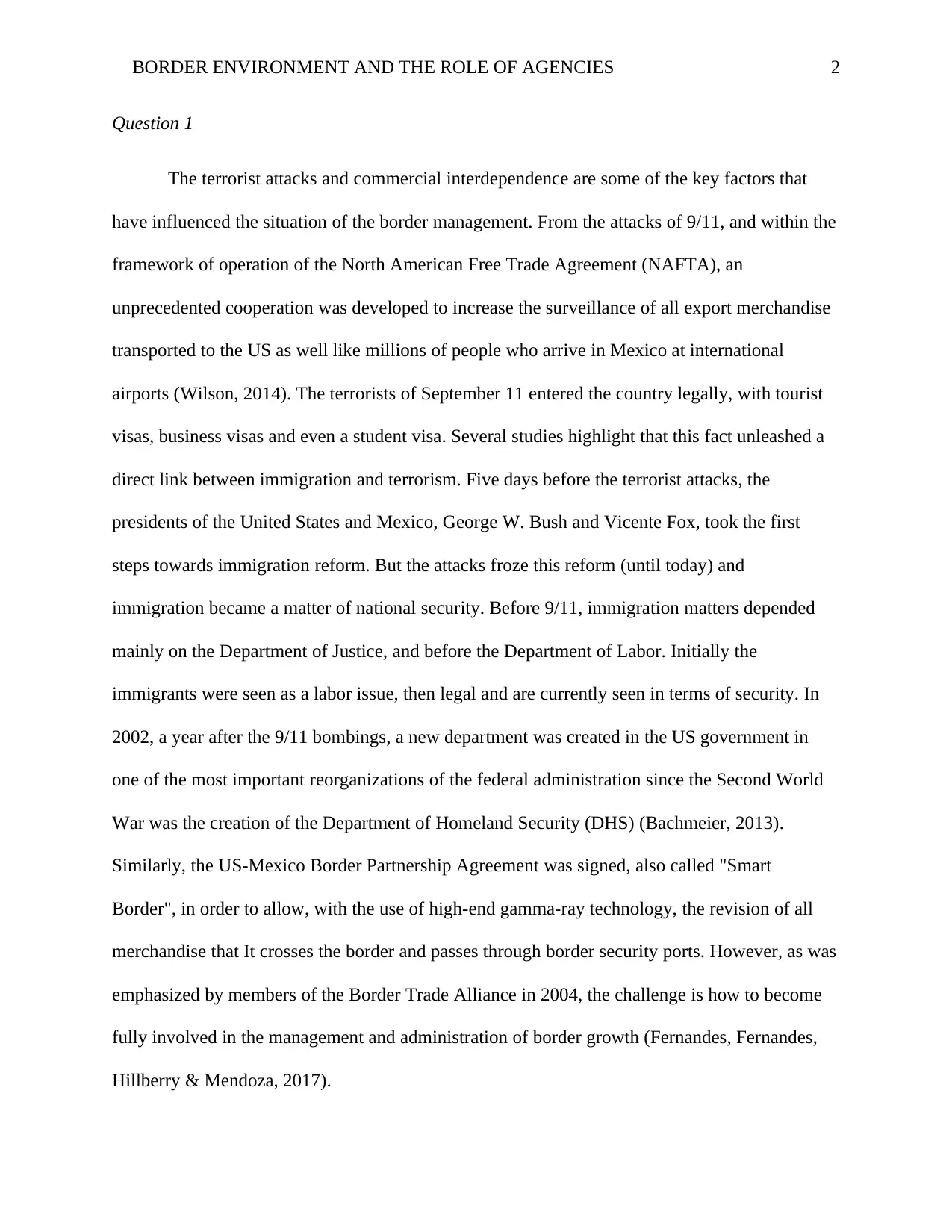
BORDER ENVIRONMENT AND THE ROLE OF AGENCIES 2
Question 1
The terrorist attacks and commercial interdependence are some of the key factors that
have influenced the situation of the border management. From the attacks of 9/11, and within the
framework of operation of the North American Free Trade Agreement (NAFTA), an
unprecedented cooperation was developed to increase the surveillance of all export merchandise
transported to the US as well like millions of people who arrive in Mexico at international
airports (Wilson, 2014). The terrorists of September 11 entered the country legally, with tourist
visas, business visas and even a student visa. Several studies highlight that this fact unleashed a
direct link between immigration and terrorism. Five days before the terrorist attacks, the
presidents of the United States and Mexico, George W. Bush and Vicente Fox, took the first
steps towards immigration reform. But the attacks froze this reform (until today) and
immigration became a matter of national security. Before 9/11, immigration matters depended
mainly on the Department of Justice, and before the Department of Labor. Initially the
immigrants were seen as a labor issue, then legal and are currently seen in terms of security. In
2002, a year after the 9/11 bombings, a new department was created in the US government in
one of the most important reorganizations of the federal administration since the Second World
War was the creation of the Department of Homeland Security (DHS) (Bachmeier, 2013).
Similarly, the US-Mexico Border Partnership Agreement was signed, also called "Smart
Border", in order to allow, with the use of high-end gamma-ray technology, the revision of all
merchandise that It crosses the border and passes through border security ports. However, as was
emphasized by members of the Border Trade Alliance in 2004, the challenge is how to become
fully involved in the management and administration of border growth (Fernandes, Fernandes,
Hillberry & Mendoza, 2017).
Question 1
The terrorist attacks and commercial interdependence are some of the key factors that
have influenced the situation of the border management. From the attacks of 9/11, and within the
framework of operation of the North American Free Trade Agreement (NAFTA), an
unprecedented cooperation was developed to increase the surveillance of all export merchandise
transported to the US as well like millions of people who arrive in Mexico at international
airports (Wilson, 2014). The terrorists of September 11 entered the country legally, with tourist
visas, business visas and even a student visa. Several studies highlight that this fact unleashed a
direct link between immigration and terrorism. Five days before the terrorist attacks, the
presidents of the United States and Mexico, George W. Bush and Vicente Fox, took the first
steps towards immigration reform. But the attacks froze this reform (until today) and
immigration became a matter of national security. Before 9/11, immigration matters depended
mainly on the Department of Justice, and before the Department of Labor. Initially the
immigrants were seen as a labor issue, then legal and are currently seen in terms of security. In
2002, a year after the 9/11 bombings, a new department was created in the US government in
one of the most important reorganizations of the federal administration since the Second World
War was the creation of the Department of Homeland Security (DHS) (Bachmeier, 2013).
Similarly, the US-Mexico Border Partnership Agreement was signed, also called "Smart
Border", in order to allow, with the use of high-end gamma-ray technology, the revision of all
merchandise that It crosses the border and passes through border security ports. However, as was
emphasized by members of the Border Trade Alliance in 2004, the challenge is how to become
fully involved in the management and administration of border growth (Fernandes, Fernandes,
Hillberry & Mendoza, 2017).
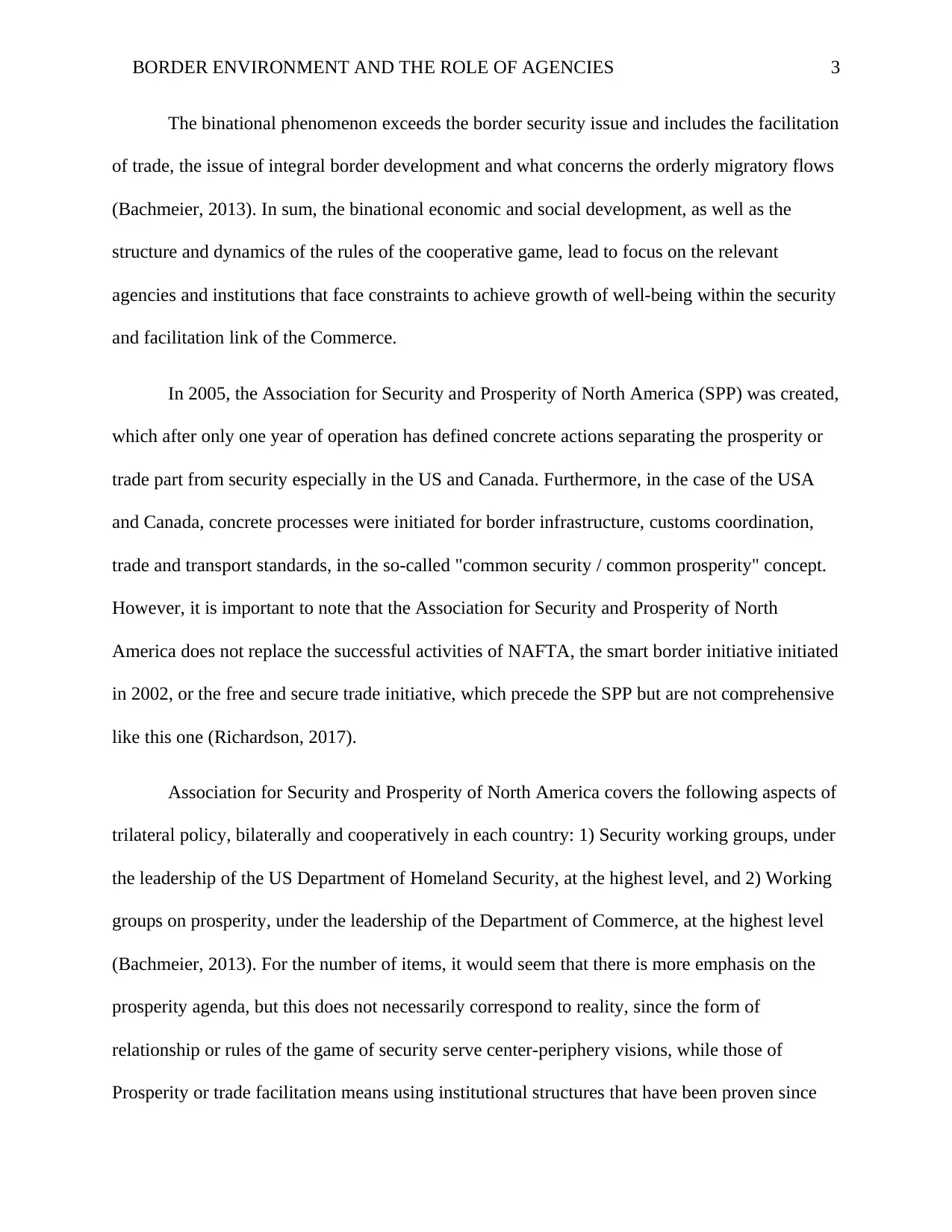
BORDER ENVIRONMENT AND THE ROLE OF AGENCIES 3
The binational phenomenon exceeds the border security issue and includes the facilitation
of trade, the issue of integral border development and what concerns the orderly migratory flows
(Bachmeier, 2013). In sum, the binational economic and social development, as well as the
structure and dynamics of the rules of the cooperative game, lead to focus on the relevant
agencies and institutions that face constraints to achieve growth of well-being within the security
and facilitation link of the Commerce.
In 2005, the Association for Security and Prosperity of North America (SPP) was created,
which after only one year of operation has defined concrete actions separating the prosperity or
trade part from security especially in the US and Canada. Furthermore, in the case of the USA
and Canada, concrete processes were initiated for border infrastructure, customs coordination,
trade and transport standards, in the so-called "common security / common prosperity" concept.
However, it is important to note that the Association for Security and Prosperity of North
America does not replace the successful activities of NAFTA, the smart border initiative initiated
in 2002, or the free and secure trade initiative, which precede the SPP but are not comprehensive
like this one (Richardson, 2017).
Association for Security and Prosperity of North America covers the following aspects of
trilateral policy, bilaterally and cooperatively in each country: 1) Security working groups, under
the leadership of the US Department of Homeland Security, at the highest level, and 2) Working
groups on prosperity, under the leadership of the Department of Commerce, at the highest level
(Bachmeier, 2013). For the number of items, it would seem that there is more emphasis on the
prosperity agenda, but this does not necessarily correspond to reality, since the form of
relationship or rules of the game of security serve center-periphery visions, while those of
Prosperity or trade facilitation means using institutional structures that have been proven since
The binational phenomenon exceeds the border security issue and includes the facilitation
of trade, the issue of integral border development and what concerns the orderly migratory flows
(Bachmeier, 2013). In sum, the binational economic and social development, as well as the
structure and dynamics of the rules of the cooperative game, lead to focus on the relevant
agencies and institutions that face constraints to achieve growth of well-being within the security
and facilitation link of the Commerce.
In 2005, the Association for Security and Prosperity of North America (SPP) was created,
which after only one year of operation has defined concrete actions separating the prosperity or
trade part from security especially in the US and Canada. Furthermore, in the case of the USA
and Canada, concrete processes were initiated for border infrastructure, customs coordination,
trade and transport standards, in the so-called "common security / common prosperity" concept.
However, it is important to note that the Association for Security and Prosperity of North
America does not replace the successful activities of NAFTA, the smart border initiative initiated
in 2002, or the free and secure trade initiative, which precede the SPP but are not comprehensive
like this one (Richardson, 2017).
Association for Security and Prosperity of North America covers the following aspects of
trilateral policy, bilaterally and cooperatively in each country: 1) Security working groups, under
the leadership of the US Department of Homeland Security, at the highest level, and 2) Working
groups on prosperity, under the leadership of the Department of Commerce, at the highest level
(Bachmeier, 2013). For the number of items, it would seem that there is more emphasis on the
prosperity agenda, but this does not necessarily correspond to reality, since the form of
relationship or rules of the game of security serve center-periphery visions, while those of
Prosperity or trade facilitation means using institutional structures that have been proven since
⊘ This is a preview!⊘
Do you want full access?
Subscribe today to unlock all pages.

Trusted by 1+ million students worldwide
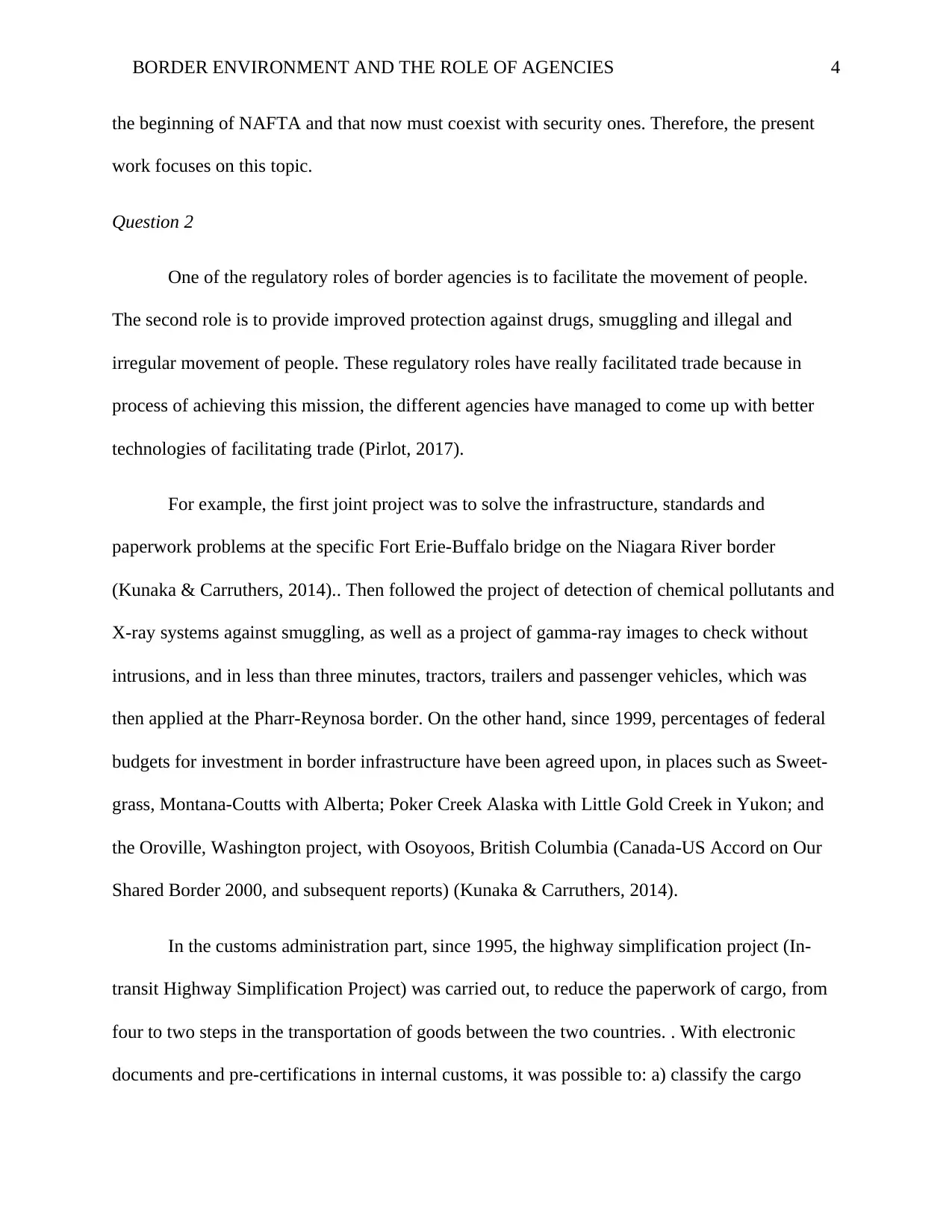
BORDER ENVIRONMENT AND THE ROLE OF AGENCIES 4
the beginning of NAFTA and that now must coexist with security ones. Therefore, the present
work focuses on this topic.
Question 2
One of the regulatory roles of border agencies is to facilitate the movement of people.
The second role is to provide improved protection against drugs, smuggling and illegal and
irregular movement of people. These regulatory roles have really facilitated trade because in
process of achieving this mission, the different agencies have managed to come up with better
technologies of facilitating trade (Pirlot, 2017).
For example, the first joint project was to solve the infrastructure, standards and
paperwork problems at the specific Fort Erie-Buffalo bridge on the Niagara River border
(Kunaka & Carruthers, 2014).. Then followed the project of detection of chemical pollutants and
X-ray systems against smuggling, as well as a project of gamma-ray images to check without
intrusions, and in less than three minutes, tractors, trailers and passenger vehicles, which was
then applied at the Pharr-Reynosa border. On the other hand, since 1999, percentages of federal
budgets for investment in border infrastructure have been agreed upon, in places such as Sweet-
grass, Montana-Coutts with Alberta; Poker Creek Alaska with Little Gold Creek in Yukon; and
the Oroville, Washington project, with Osoyoos, British Columbia (Canada-US Accord on Our
Shared Border 2000, and subsequent reports) (Kunaka & Carruthers, 2014).
In the customs administration part, since 1995, the highway simplification project (In-
transit Highway Simplification Project) was carried out, to reduce the paperwork of cargo, from
four to two steps in the transportation of goods between the two countries. . With electronic
documents and pre-certifications in internal customs, it was possible to: a) classify the cargo
the beginning of NAFTA and that now must coexist with security ones. Therefore, the present
work focuses on this topic.
Question 2
One of the regulatory roles of border agencies is to facilitate the movement of people.
The second role is to provide improved protection against drugs, smuggling and illegal and
irregular movement of people. These regulatory roles have really facilitated trade because in
process of achieving this mission, the different agencies have managed to come up with better
technologies of facilitating trade (Pirlot, 2017).
For example, the first joint project was to solve the infrastructure, standards and
paperwork problems at the specific Fort Erie-Buffalo bridge on the Niagara River border
(Kunaka & Carruthers, 2014).. Then followed the project of detection of chemical pollutants and
X-ray systems against smuggling, as well as a project of gamma-ray images to check without
intrusions, and in less than three minutes, tractors, trailers and passenger vehicles, which was
then applied at the Pharr-Reynosa border. On the other hand, since 1999, percentages of federal
budgets for investment in border infrastructure have been agreed upon, in places such as Sweet-
grass, Montana-Coutts with Alberta; Poker Creek Alaska with Little Gold Creek in Yukon; and
the Oroville, Washington project, with Osoyoos, British Columbia (Canada-US Accord on Our
Shared Border 2000, and subsequent reports) (Kunaka & Carruthers, 2014).
In the customs administration part, since 1995, the highway simplification project (In-
transit Highway Simplification Project) was carried out, to reduce the paperwork of cargo, from
four to two steps in the transportation of goods between the two countries. . With electronic
documents and pre-certifications in internal customs, it was possible to: a) classify the cargo
Paraphrase This Document
Need a fresh take? Get an instant paraphrase of this document with our AI Paraphraser
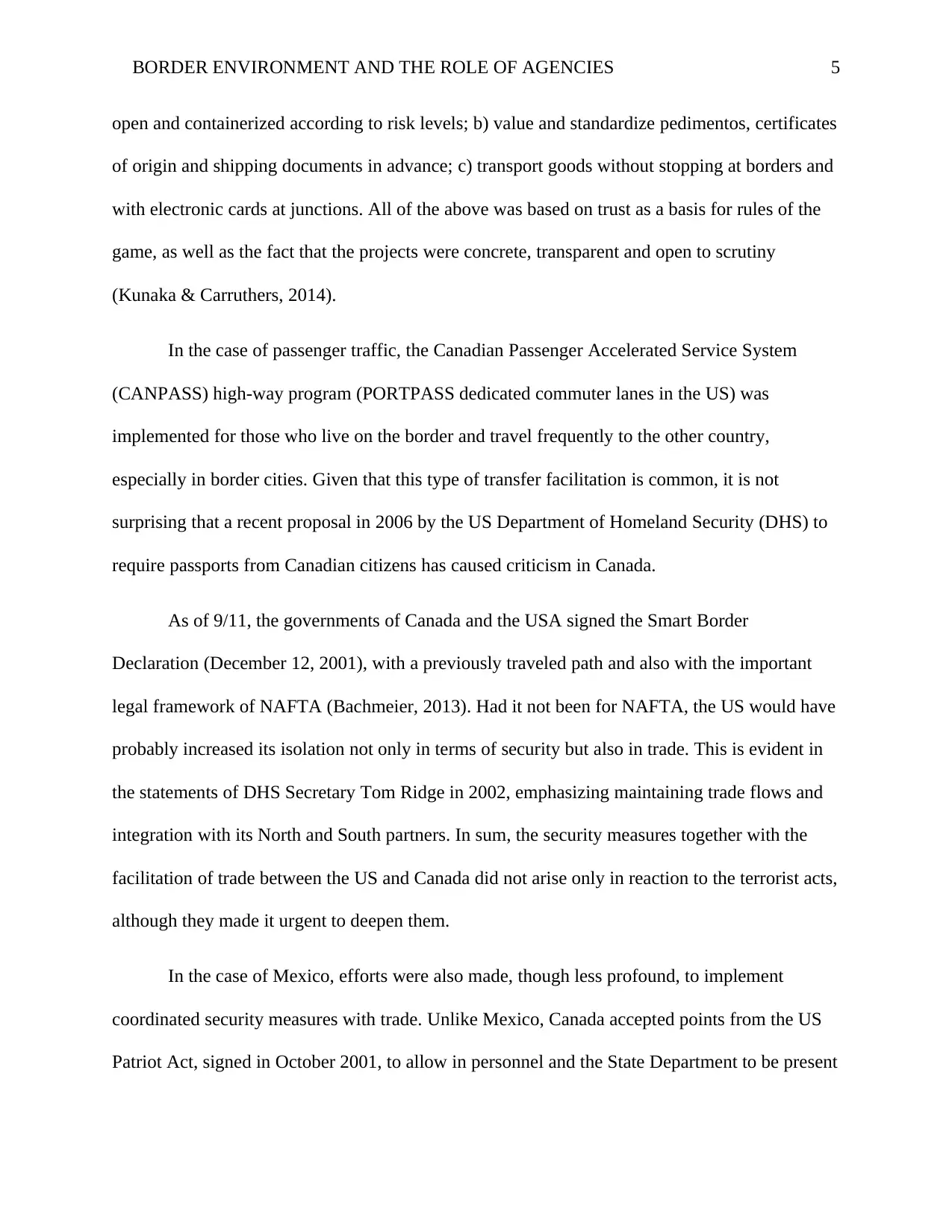
BORDER ENVIRONMENT AND THE ROLE OF AGENCIES 5
open and containerized according to risk levels; b) value and standardize pedimentos, certificates
of origin and shipping documents in advance; c) transport goods without stopping at borders and
with electronic cards at junctions. All of the above was based on trust as a basis for rules of the
game, as well as the fact that the projects were concrete, transparent and open to scrutiny
(Kunaka & Carruthers, 2014).
In the case of passenger traffic, the Canadian Passenger Accelerated Service System
(CANPASS) high-way program (PORTPASS dedicated commuter lanes in the US) was
implemented for those who live on the border and travel frequently to the other country,
especially in border cities. Given that this type of transfer facilitation is common, it is not
surprising that a recent proposal in 2006 by the US Department of Homeland Security (DHS) to
require passports from Canadian citizens has caused criticism in Canada.
As of 9/11, the governments of Canada and the USA signed the Smart Border
Declaration (December 12, 2001), with a previously traveled path and also with the important
legal framework of NAFTA (Bachmeier, 2013). Had it not been for NAFTA, the US would have
probably increased its isolation not only in terms of security but also in trade. This is evident in
the statements of DHS Secretary Tom Ridge in 2002, emphasizing maintaining trade flows and
integration with its North and South partners. In sum, the security measures together with the
facilitation of trade between the US and Canada did not arise only in reaction to the terrorist acts,
although they made it urgent to deepen them.
In the case of Mexico, efforts were also made, though less profound, to implement
coordinated security measures with trade. Unlike Mexico, Canada accepted points from the US
Patriot Act, signed in October 2001, to allow in personnel and the State Department to be present
open and containerized according to risk levels; b) value and standardize pedimentos, certificates
of origin and shipping documents in advance; c) transport goods without stopping at borders and
with electronic cards at junctions. All of the above was based on trust as a basis for rules of the
game, as well as the fact that the projects were concrete, transparent and open to scrutiny
(Kunaka & Carruthers, 2014).
In the case of passenger traffic, the Canadian Passenger Accelerated Service System
(CANPASS) high-way program (PORTPASS dedicated commuter lanes in the US) was
implemented for those who live on the border and travel frequently to the other country,
especially in border cities. Given that this type of transfer facilitation is common, it is not
surprising that a recent proposal in 2006 by the US Department of Homeland Security (DHS) to
require passports from Canadian citizens has caused criticism in Canada.
As of 9/11, the governments of Canada and the USA signed the Smart Border
Declaration (December 12, 2001), with a previously traveled path and also with the important
legal framework of NAFTA (Bachmeier, 2013). Had it not been for NAFTA, the US would have
probably increased its isolation not only in terms of security but also in trade. This is evident in
the statements of DHS Secretary Tom Ridge in 2002, emphasizing maintaining trade flows and
integration with its North and South partners. In sum, the security measures together with the
facilitation of trade between the US and Canada did not arise only in reaction to the terrorist acts,
although they made it urgent to deepen them.
In the case of Mexico, efforts were also made, though less profound, to implement
coordinated security measures with trade. Unlike Mexico, Canada accepted points from the US
Patriot Act, signed in October 2001, to allow in personnel and the State Department to be present
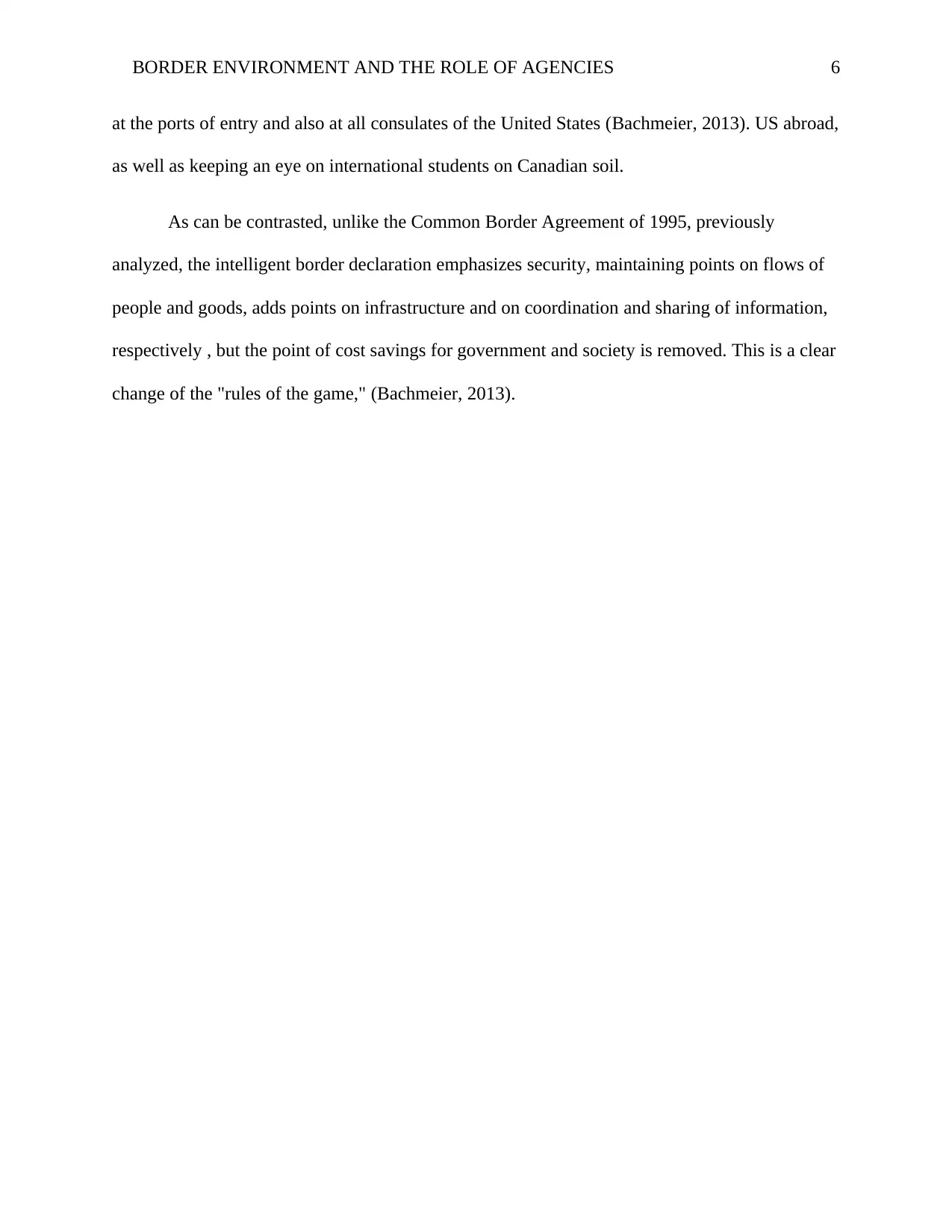
BORDER ENVIRONMENT AND THE ROLE OF AGENCIES 6
at the ports of entry and also at all consulates of the United States (Bachmeier, 2013). US abroad,
as well as keeping an eye on international students on Canadian soil.
As can be contrasted, unlike the Common Border Agreement of 1995, previously
analyzed, the intelligent border declaration emphasizes security, maintaining points on flows of
people and goods, adds points on infrastructure and on coordination and sharing of information,
respectively , but the point of cost savings for government and society is removed. This is a clear
change of the "rules of the game," (Bachmeier, 2013).
at the ports of entry and also at all consulates of the United States (Bachmeier, 2013). US abroad,
as well as keeping an eye on international students on Canadian soil.
As can be contrasted, unlike the Common Border Agreement of 1995, previously
analyzed, the intelligent border declaration emphasizes security, maintaining points on flows of
people and goods, adds points on infrastructure and on coordination and sharing of information,
respectively , but the point of cost savings for government and society is removed. This is a clear
change of the "rules of the game," (Bachmeier, 2013).
⊘ This is a preview!⊘
Do you want full access?
Subscribe today to unlock all pages.

Trusted by 1+ million students worldwide
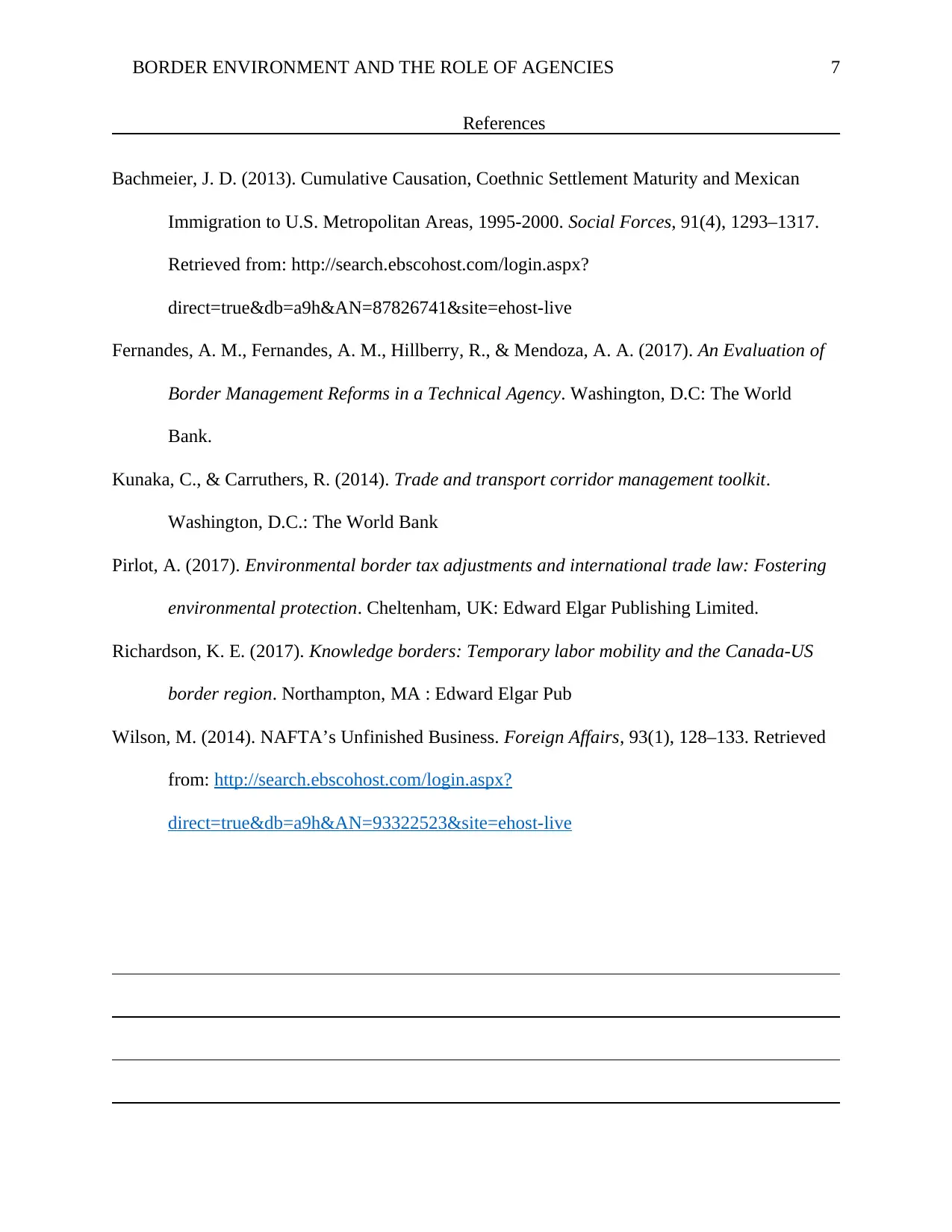
BORDER ENVIRONMENT AND THE ROLE OF AGENCIES 7
References
Bachmeier, J. D. (2013). Cumulative Causation, Coethnic Settlement Maturity and Mexican
Immigration to U.S. Metropolitan Areas, 1995-2000. Social Forces, 91(4), 1293–1317.
Retrieved from: http://search.ebscohost.com/login.aspx?
direct=true&db=a9h&AN=87826741&site=ehost-live
Fernandes, A. M., Fernandes, A. M., Hillberry, R., & Mendoza, A. A. (2017). An Evaluation of
Border Management Reforms in a Technical Agency. Washington, D.C: The World
Bank.
Kunaka, C., & Carruthers, R. (2014). Trade and transport corridor management toolkit.
Washington, D.C.: The World Bank
Pirlot, A. (2017). Environmental border tax adjustments and international trade law: Fostering
environmental protection. Cheltenham, UK: Edward Elgar Publishing Limited.
Richardson, K. E. (2017). Knowledge borders: Temporary labor mobility and the Canada-US
border region. Northampton, MA : Edward Elgar Pub
Wilson, M. (2014). NAFTA’s Unfinished Business. Foreign Affairs, 93(1), 128–133. Retrieved
from: http://search.ebscohost.com/login.aspx?
direct=true&db=a9h&AN=93322523&site=ehost-live
References
Bachmeier, J. D. (2013). Cumulative Causation, Coethnic Settlement Maturity and Mexican
Immigration to U.S. Metropolitan Areas, 1995-2000. Social Forces, 91(4), 1293–1317.
Retrieved from: http://search.ebscohost.com/login.aspx?
direct=true&db=a9h&AN=87826741&site=ehost-live
Fernandes, A. M., Fernandes, A. M., Hillberry, R., & Mendoza, A. A. (2017). An Evaluation of
Border Management Reforms in a Technical Agency. Washington, D.C: The World
Bank.
Kunaka, C., & Carruthers, R. (2014). Trade and transport corridor management toolkit.
Washington, D.C.: The World Bank
Pirlot, A. (2017). Environmental border tax adjustments and international trade law: Fostering
environmental protection. Cheltenham, UK: Edward Elgar Publishing Limited.
Richardson, K. E. (2017). Knowledge borders: Temporary labor mobility and the Canada-US
border region. Northampton, MA : Edward Elgar Pub
Wilson, M. (2014). NAFTA’s Unfinished Business. Foreign Affairs, 93(1), 128–133. Retrieved
from: http://search.ebscohost.com/login.aspx?
direct=true&db=a9h&AN=93322523&site=ehost-live
1 out of 7
Your All-in-One AI-Powered Toolkit for Academic Success.
+13062052269
info@desklib.com
Available 24*7 on WhatsApp / Email
![[object Object]](/_next/static/media/star-bottom.7253800d.svg)
Unlock your academic potential
Copyright © 2020–2026 A2Z Services. All Rights Reserved. Developed and managed by ZUCOL.